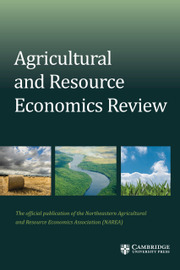Article contents
Farmland Preservation and Differential Taxation: Evaluating Optimal Policy Under Conditions of Uncertainty
Published online by Cambridge University Press: 15 September 2016
Abstract
Differential property tax policy for farmland is often set under conditions of uncertainty and limited information regarding landowners’ objective functions. This study examines optimal differential tax policy for a parcel of agricultural land facing uncertain development, identifying instances in which common farmland taxation policies may be non-optimal. Optimal tax rates are characterized given three possible causes of uncertain development: exogenous offers from developers, tax-related reductions in landowner wealth, and a combination of these factors. Model results indicate that underlying causes of uncertain development are critical when seeking to assess the optimality of differential taxation policies, and the use of a single, time-invariant differential tax levy is rarely optimal given uncertain development.
Keywords
- Type
- Articles
- Information
- Copyright
- Copyright © 2003 Northeastern Agricultural and Resource Economics Association
References
- 3
- Cited by


